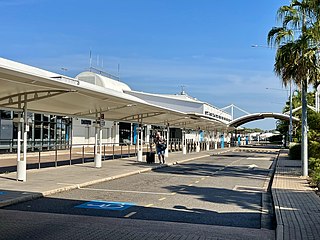Qantas Airways Limited is the flag carrier of Australia. It is the largest airline by fleet size, international flights, and international destinations in Australia and Oceania. Qantas is the world's third-oldest airline by foundation date and the oldest airline in the English-speaking world — being founded in November 1920. Qantas is a founding member of the Oneworld airline alliance.
Air New Zealand Limited is the flag carrier of New Zealand. Based in Auckland, the airline operates scheduled passenger flights to 20 domestic and 30 international destinations in 18 countries, primarily within the Pacific Rim. The airline has been a member of the Star Alliance since 1999.

Air Vanuatu is an airline with its head office in Air Vanuatu House, Port Vila, Vanuatu. It is Vanuatu's national flag carrier, operating to Australia, New Zealand, New Caledonia and points in the South Pacific. Its main base is Bauerfield International Airport, Port Vila. In May 2024 the airline was placed into voluntary administration by the Government of Vanuatu.

Melbourne Airport, known locally as Tullamarine Airport, is the main international airport serving the city of Melbourne, the capital of the Australian state of Victoria. It is the second busiest airport in Australia. The airport operates 24/7 and has on-site parking, world-class shopping and dining. The airport opened in 1970 and replaced Essendon Airport. Melbourne Airport is the main international airport of the four airports serving the Melbourne metropolitan area, the other international airport being Avalon Airport.
Virgin Australia, the trading name of Virgin Australia Airlines Pty Ltd, is an airline based in Brisbane, Australia. It is one of two active airlines to use the Virgin brand, as well as the larger by fleet size. It commenced services on 31 August 2000 as Virgin Blue, with two aircraft on a single route. It suddenly found itself as a major airline in Australia's domestic market after the collapse of Ansett Australia in September 2001. The airline has since grown to directly serve 32 cities in Australia, from hubs in Brisbane, Melbourne and Sydney.
Jetstar Airways Pty Ltd, operating as Jetstar, is an Australian low-cost airline headquartered in Melbourne, Victoria. It is a wholly owned subsidiary of Qantas, created in response to the threat posed by the airline Virgin Blue. Jetstar is part of Qantas' two brand strategy of having Qantas Airways for the premium full-service market and Jetstar for the low-cost market. As of June 2015, Jetstar was carrying 8.5% of all passengers travelling in and out of Australia.

Australian labour law sets the rights of working people, the role of trade unions, and democracy at work, and the duties of employers, across the Commonwealth and in states. Under the Fair Work Act 2009, the Fair Work Commission creates a national minimum wage and oversees National Employment Standards for fair hours, holidays, parental leave and job security. The FWC also creates modern awards that apply to most sectors of work, numbering 150 in 2024, with minimum pay scales, and better rights for overtime, holidays, paid leave, and superannuation for a pension in retirement. Beyond this floor of rights, trade unions and employers often create enterprise bargaining agreements for better wages and conditions in their workplaces. In 2024, collective agreements covered 15% of employees, while 22% of employees were classified as "casual", meaning that they lose many protections other workers have. Australia's laws on the right to take collective action are among the most restrictive in the developed world, and Australia does not have a general law protecting workers' rights to vote and elect worker directors on corporation boards as do most other wealthy OECD countries.

Canberra Airport is an international airport situated in the district of Majura, Australian Capital Territory. It serves Australia's capital city, Canberra, as well as the nearby city of Queanbeyan and regional areas of the Australian Capital Territory and southeastern New South Wales. Located approximately 8 km (5.0 mi) from the city centre, within the North Canberra district, it is the ninth-busiest airport in Australia.
Jetstar Asia Airways Pte Ltd is a Singaporean low-cost airline headquartered at Changi Airport. It operates services to regional destinations in Southeast Asia to countries such as Myanmar, Cambodia, Malaysia, Indonesia, Philippines, Thailand and Vietnam. It also flies to regional routes in East Asia such as Japan, Taiwan and Hong Kong.

The Kangaroo Route is a term coined by Qantas, referring to the commercial passenger air routes flown between Australia and the United Kingdom via the Eastern Hemisphere.

Darwin International Airport is a domestic and international airport, and the only airport serving Darwin, Australia. It is the eleventh busiest airport in Australia measured by passenger movements.

Brindabella Airlines was an Australian regional airline established in 1994. Its headquarters were at Canberra Airport. On 15 December 2013 the airline was placed in receivership.
Jetconnect Ltd. is a wholly owned subsidiary of Qantas with its head office located in Auckland, New Zealand. Originally established in July 2002 as a New Zealand–based airline, the company stopped operating as an airline in 2018 but continues to employ pilots and cabin crew based at Auckland and Wellington airports. Crew employed by Jetconnect operate Qantas flights on trans-tasman services between Australia and New Zealand, with cabin crew also operating on Qantas long-haul flights alongside Australian-based crew.
The Australian Federation of Air Pilots (AFAP) is a professional association and industrial organisation for commercial pilots in Australia.

Tiger Airways Australia Pty Ltd, operating as Tigerair Australia, was an Australian low-cost airline. Founded by Tiger Airways Holdings, it commenced services in the domestic airline market on 23 November 2007 as Tiger Airways Australia. It later became a subsidiary of Virgin Australia Holdings. On 25 March 2020, Tigerair suspended all operations as a result of the COVID-19 pandemic. Following Virgin Australia Holdings going into voluntary administration and later sold, new owner Bain Capital confirmed the brand would be retired.

Alan Joseph Joyce is an Irish-Australian businessman. He was the chief executive officer (CEO) of Qantas Airways Limited from 2008 until his resignation in 2023. Joyce retired as CEO on 5 September 2023, with Vanessa Hudson succeeding him the following day.

Qantas Flight 32 was a regularly scheduled passenger flight from London to Sydney via Singapore. On 4 November 2010, the aircraft operating the route, an Airbus A380, suffered an uncontained failure in one of its four Rolls-Royce Trent 900 engines. The failure occurred over the Riau Islands, Indonesia, four minutes after takeoff from Singapore Changi Airport. After holding for almost two hours to assess the situation, the aircraft made a successful emergency landing at Changi. No injuries occurred to the passengers, crew, or people on the ground, despite debris from the aircraft falling onto houses in Batam.

Qantas Flight 7 (QF7/QFA7) and Qantas Flight 8 (QF8/QFA8) are flights operated by Australian airline Qantas between Sydney Airport and Dallas/Fort Worth International Airport, which, from 2013 to 2016, were the longest regularly scheduled non-stop commercial flights in the world. As of January 2024, they are the 11th longest regularly scheduled non-stop commercial flights in the world as measured by great-circle distance—13,804 kilometres, which is over one third of the distance around Earth.
Vanessa Hudson is an Australian business executive and CEO of Qantas since 2023, having first joined the company in 1994. Since joining the airline, Hudson has been in a variety of senior positions, culminating in 2023 when she was announced as the company's next CEO to succeed Alan Joyce in November 2023. Hudson was set to become the first female CEO of Qantas. On 5 September 2023, it was announced Joyce would quit early following revelations the company may have continued to sell tickets for flights that had already been cancelled, with Hudson taking over the following day.











